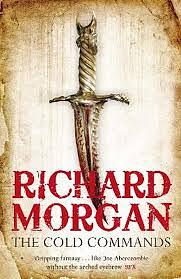Take a photo of a barcode or cover
I don't know what I was doing while listening to this audiobook, but it wasn't "listening to this audiobook." I couldn't tell you a think about this, so I will not actually review it. But probably says something about the engaging-ness of the plot.
Morgan continues the clumsy sex scenes in The Cold Commands but luckily for us this is a dark fantasy romance novel so they are few and far between. Ringil et al are back and with their enemies still plotting and scheming.
Building even more on the world created in The Steel Remains we are privy to more of the machinations of the Dwenda and it's a glorious revelation. It's a little harder to write about this one without spoilers but I'll give it a shot.
After crafting the world in the first book, Morgan deepens the colors and adds to the hopelessness by slowly revealing that some of our protagonists are being moved along by the forces of the world, caught up in an undertow that thy themselves can't see. While there was sense of that in The Steel Remains, it becomes even more clear in The Cold Commands.
There is a scene, a moment, a completely understated blip, where surrender is the only option and it's so well done and subtle, that even with the clumsy attempt at sex scenes, took this to higher level than the opening salvo in the series.
My only advice is to ignore what appears to be the main plot because that's the drag on this story. It's not the main plot and I think that if it were meant as a distraction that Morgan failed on that point. I suspect the third book in the installment will follow up on what appeared, for most of the book, to be the main plot but if Morgan were wishing for an "AHA" moment from the readers that he failed to deliver.
I didn't have a lot of expectations going in to this one because of the some of the clumsiness of the first book and was pleasantly surprised. It still doesn't rise to a four star review but and some the same issues remain. However it's good read and the clumsiness can be overlooked. While not a perfect book it's enough of an improvement that I'm looking forward to reading The Dark Defiles. Morgan has raised both my hopes and my expectations.
Building even more on the world created in The Steel Remains we are privy to more of the machinations of the Dwenda and it's a glorious revelation. It's a little harder to write about this one without spoilers but I'll give it a shot.
After crafting the world in the first book, Morgan deepens the colors and adds to the hopelessness by slowly revealing that some of our protagonists are being moved along by the forces of the world, caught up in an undertow that thy themselves can't see. While there was sense of that in The Steel Remains, it becomes even more clear in The Cold Commands.
There is a scene, a moment, a completely understated blip, where surrender is the only option and it's so well done and subtle, that even with the clumsy attempt at sex scenes, took this to higher level than the opening salvo in the series.
My only advice is to ignore what appears to be the main plot because that's the drag on this story. It's not the main plot and I think that if it were meant as a distraction that Morgan failed on that point. I suspect the third book in the installment will follow up on what appeared, for most of the book, to be the main plot but if Morgan were wishing for an "AHA" moment from the readers that he failed to deliver.
I didn't have a lot of expectations going in to this one because of the some of the clumsiness of the first book and was pleasantly surprised. It still doesn't rise to a four star review but and some the same issues remain. However it's good read and the clumsiness can be overlooked. While not a perfect book it's enough of an improvement that I'm looking forward to reading The Dark Defiles. Morgan has raised both my hopes and my expectations.
The writing is excellent and the characters are fun. But there were a number of times I couldn't figure out what was going on in the story... Morgan uses a a lot of shorthand, describing magic and/or technology without ever really explaining it. Still, when that happens you can always count on a sword fight breaking out to get things going again. And it's definitely different enough from the normal fare to stay interesting.
This was a wild ride, and so incredibly brutal I didn’t think I expected it to be more brutal than the first wow. However the way it’s written didn’t throw me off like it usually does, which is very intriguing honestly.
Ringil is a badass, lots of shit went down and I’m really curious how the last book in this series is going to go, after how the last quarter or so of this book went I see a lot of bad things happening LOL
I was about to give this 4 stars for having a slow first half but after the ending I decided that the slow start was well done and worth it for what came after.
Book 3 is probably gonna wreck me if the brutality steps up again but I’m excited for it!
Ringil is a badass, lots of shit went down and I’m really curious how the last book in this series is going to go, after how the last quarter or so of this book went I see a lot of bad things happening LOL
I was about to give this 4 stars for having a slow first half but after the ending I decided that the slow start was well done and worth it for what came after.
Book 3 is probably gonna wreck me if the brutality steps up again but I’m excited for it!
adventurous
dark
tense
medium-paced
Plot or Character Driven:
A mix
Strong character development:
Yes
Loveable characters:
Yes
Diverse cast of characters:
Yes
Flaws of characters a main focus:
Yes
Es como un relato corto demasiado alargado y sólo sirve de intermedio entre el primer y el tercer libro. Para que os hagáis una idea el protagonista tarda en salir como seis capítulos.
Sin embargo los personajes me parecen brillantes, incluso he terminado de cogerle el punto a Archeth hacia el final del libro.
Me da una rabia enorme no haber podido estar en el Celsius para hacerle preguntas a Richard Morgan.
Sin embargo los personajes me parecen brillantes, incluso he terminado de cogerle el punto a Archeth hacia el final del libro.
Me da una rabia enorme no haber podido estar en el Celsius para hacerle preguntas a Richard Morgan.
I'd like to say that The Cold Commands is a satisfactory or entertaining sequel to Richard Morgan's The Steel Remains, but those who have read the latter would know that I was lying through my teeth; it couldn't be either. So I will go with 'appropriate.' Other adjectives to describe it as a novel include 'enthralling,' 'chilling', and 'relentless'.
You could probably read this without having read the first book, but personally I wouldn't recommend it; partly because things make more sense in context, and partly because The Steel Remains is excellent.
The enthralling part comes largely from the characters: the situations they find themselves in and their development as people. As with the first book, the story is largely told from the perspective of Ringil, Egar and Archeth. Ringil is recovering - slowly - from his time with the dwenda Seethlaw, but he has changed: not only older, maybe wiser, definitely sorer, but in some even more intangible ways also involving blue fire and interest from the dark gods themselves. Ringil is a delightfully ironic take on the stereotypical fantasy hero; he's a warrior, wields a sword gifted to him by non-humans, and has a strong sense of justice... but he's also homosexual in a world that doesn't accept that, has been disowned by his family and forgotten by most of the world, and doesn't particularly want to fight most of the time. On the other hand, Egar Dragonbane quite likes fighting, almost as much as he likes having sex. Exiled from his home on the barren steppes, Egar is struggling to come to terms again with city living and his one-time mistress. Egar is definitely more in the Conan tradition, and provides an interesting contrast to Ringil, with the added benefit of more brains that nomadic barbarians have classically been awarded. Also, more humour. Rounding out a truly unlikely trio is Archeth, I think the most interesting of the three. She's a half-breed - half human, half Kiriath, the now-absent one-time allies of the humans - which means she has access to and some control over what might be magic or might be highly advanced technology (there's definitely some playing with the old Clarke adage here). She too is homosexual, leading to some difficulties, which combined with the fact that she is female and has the ear of the emperor - sometimes - leads to clashes with religious authorities. On top of all of this is her continuing anguish at having been left behind by the Kiriath, which she feels both as a betrayal, and as a failure on her part, of not being good enough to accompany them. These three came together many years before the events in even The Steel Remains, to deal with the threat posed by the Dragons. The Steel Remains was mostly about their individual adventures and problems, with those issues coming together towards the end to reveal the beginnings of a very interesting pattern. Here, they have their own chapters, but the links between them are more obvious and their private fights and confrontations more definitely, if still obscurely, connected.
Chilling and relentless describe the overall plot; both are to be expected in a novel by Richard Morgan. The Steel Remains left our (anti)heroes having defeated a possible dwenda invasion, and feeling slightly uncomfortable about what that might mean for their world. Dwenda are still something of an issue in this sequel, but there are other maybe-threats too, such as the Dark Court, the gods worshipped by some, who are paying an disturbing level of interest to the goings-on of individuals like Ringil; and something, or possibly someone, that appears to have newly come from the absent Kiriath but without a user's manual. Plus there's the everyday, run of the mill threats like a mildly crazy emperor (who might feed you to the octopus), unpleasantly near-crazy religious zealots, and inter-city strife over trade and slavery. The relentless part comes from the steady pace of things going wrong or new problems being discovered. It's not frenetic, in that the characters are not running from one thing to the other unless they're being chased; instead it's like a normal few months where almost nothing goes to plan, and problems pile up on top of each other slowly and steadily. Ringil, Egar and Archeth find themselves involved in problems they would actually rather not have anything to do with, thanks all the same, but don't seem to have a choice about. All of that is chilling, too, as is the uncomfortable knowledge that while there are some happy times for the three protagonists, this is unlikely to all end well. And then there's the deft and clever world and secondary characters created by Morgan; that's chilling too, because they are so very real. For example, the various cities and their politicking, internal and external, are intricate and recognisable, and quite clearly keep going about their business without much concern for the events being portrayed in the novel. Then there's the slavery, newly legalised in a number of states. Slavery, and the treatment of slaves, is often portrayed in an unemotional way - as a business opportunity. It's clearly not because Morgan approves of slavery; Ringil in particular works rather hard to stamp it out. But the presentation of how it could become normal very quickly is indeed chilling because of its plausibility. And the way that people appear to have forgotten recent history, too, is both plausible and recognisable.
Overall this is an enthralling piece of fiction, ticking a lot of boxes for me: quirky and original characters; action that's well-described and gritty without being in love with gore; deft world building that doesn't swamp the story; and a story that leaves me desperate for more. I am fairly sure that there should be a third book about Ringil and his grim band (not that I've seen anything official about that), which makes me very happy indeed.
You could probably read this without having read the first book, but personally I wouldn't recommend it; partly because things make more sense in context, and partly because The Steel Remains is excellent.
The enthralling part comes largely from the characters: the situations they find themselves in and their development as people. As with the first book, the story is largely told from the perspective of Ringil, Egar and Archeth. Ringil is recovering - slowly - from his time with the dwenda Seethlaw, but he has changed: not only older, maybe wiser, definitely sorer, but in some even more intangible ways also involving blue fire and interest from the dark gods themselves. Ringil is a delightfully ironic take on the stereotypical fantasy hero; he's a warrior, wields a sword gifted to him by non-humans, and has a strong sense of justice... but he's also homosexual in a world that doesn't accept that, has been disowned by his family and forgotten by most of the world, and doesn't particularly want to fight most of the time. On the other hand, Egar Dragonbane quite likes fighting, almost as much as he likes having sex. Exiled from his home on the barren steppes, Egar is struggling to come to terms again with city living and his one-time mistress. Egar is definitely more in the Conan tradition, and provides an interesting contrast to Ringil, with the added benefit of more brains that nomadic barbarians have classically been awarded. Also, more humour. Rounding out a truly unlikely trio is Archeth, I think the most interesting of the three. She's a half-breed - half human, half Kiriath, the now-absent one-time allies of the humans - which means she has access to and some control over what might be magic or might be highly advanced technology (there's definitely some playing with the old Clarke adage here). She too is homosexual, leading to some difficulties, which combined with the fact that she is female and has the ear of the emperor - sometimes - leads to clashes with religious authorities. On top of all of this is her continuing anguish at having been left behind by the Kiriath, which she feels both as a betrayal, and as a failure on her part, of not being good enough to accompany them. These three came together many years before the events in even The Steel Remains, to deal with the threat posed by the Dragons. The Steel Remains was mostly about their individual adventures and problems, with those issues coming together towards the end to reveal the beginnings of a very interesting pattern. Here, they have their own chapters, but the links between them are more obvious and their private fights and confrontations more definitely, if still obscurely, connected.
Chilling and relentless describe the overall plot; both are to be expected in a novel by Richard Morgan. The Steel Remains left our (anti)heroes having defeated a possible dwenda invasion, and feeling slightly uncomfortable about what that might mean for their world. Dwenda are still something of an issue in this sequel, but there are other maybe-threats too, such as the Dark Court, the gods worshipped by some, who are paying an disturbing level of interest to the goings-on of individuals like Ringil; and something, or possibly someone, that appears to have newly come from the absent Kiriath but without a user's manual. Plus there's the everyday, run of the mill threats like a mildly crazy emperor (who might feed you to the octopus), unpleasantly near-crazy religious zealots, and inter-city strife over trade and slavery. The relentless part comes from the steady pace of things going wrong or new problems being discovered. It's not frenetic, in that the characters are not running from one thing to the other unless they're being chased; instead it's like a normal few months where almost nothing goes to plan, and problems pile up on top of each other slowly and steadily. Ringil, Egar and Archeth find themselves involved in problems they would actually rather not have anything to do with, thanks all the same, but don't seem to have a choice about. All of that is chilling, too, as is the uncomfortable knowledge that while there are some happy times for the three protagonists, this is unlikely to all end well. And then there's the deft and clever world and secondary characters created by Morgan; that's chilling too, because they are so very real. For example, the various cities and their politicking, internal and external, are intricate and recognisable, and quite clearly keep going about their business without much concern for the events being portrayed in the novel. Then there's the slavery, newly legalised in a number of states. Slavery, and the treatment of slaves, is often portrayed in an unemotional way - as a business opportunity. It's clearly not because Morgan approves of slavery; Ringil in particular works rather hard to stamp it out. But the presentation of how it could become normal very quickly is indeed chilling because of its plausibility. And the way that people appear to have forgotten recent history, too, is both plausible and recognisable.
Overall this is an enthralling piece of fiction, ticking a lot of boxes for me: quirky and original characters; action that's well-described and gritty without being in love with gore; deft world building that doesn't swamp the story; and a story that leaves me desperate for more. I am fairly sure that there should be a third book about Ringil and his grim band (not that I've seen anything official about that), which makes me very happy indeed.
Best out of the trilogy, but I tend to like the second books best which is weird lmao
Det er sjovt, også denne bog var svær at komme igang med, men så sparkede den røv
4 overall due to a tinge of middle book syndrome but 5 stars for the ending. This man can write battles, violence and sex. So 5 stars, my friend.







